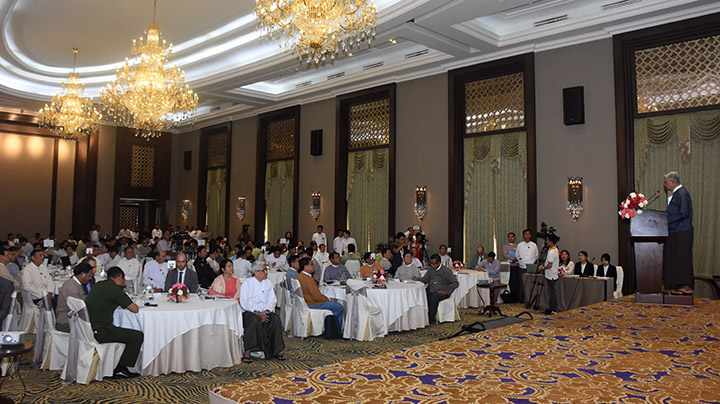10 October
The Anti-Corruption Commission organized a ceremony to test the corruption prevention unit toolkit (CPU toolkit) at Nay Pyi Taw’s Kempinski Hotel yesterday. The toolkit is supported by the innovative beneficiary engagement programme of the World Bank and aims to eliminate petty corruption.
U Aung Kyi’s remarks
ACC Chairman U Aung Kyi delivered the opening remarks where he said the CPU toolkit is a mechanism for gathering the suggestions on the service provided between an ordinary citizen and a department official. He said it is not meant to replace the existing
reporting mechanism nor supplement it.
U Aung Kyi said an anti-corruption officer at the Union Minister’s office or Nay Pyi Taw headquarters can contact a person obtaining services at a regional government office via SMS and inquire on the status of the service and provide additional support as necessary.
The ACC Chairman said this will prevent the common petty corruption prevalent in these offices from occurring. He said this programme is part of the three indispensable components of good governance, which include accountability, transparency and offering resolution.
Currently, there are 37 CPUs under 17 union ministries and 5 Union-level institutions and all of them are assigned three objectives and six agendas. He said ten important union ministries will begin testing the toolkits in some townships starting from today. He added that the remaining ministries will begin testing them too.
U Aung Kyi said prevention is more effective than resolving a lawsuit after something has occurred. He said having mechanisms in place to prevent civil servants from committing offenses reduces possible losses for the individual as well as for the nation. He urged all relevant persons to adopt a family spirit to ensure the CPUs can carry out their tasks effectively.
WB Head of Office’s remarks
Next, the Head of Office of the World Bank, Mr Gevorg Sargsyan, said corruption is an impediment to economic and social development as well as an obstacle to eradicating poverty, one of the global objectives for 2030.
He said the daily actions of civil servants may have a prominent effect on the citizens. He said former World Bank President James Wolfensohn likened corruption to cancer 20 years ago, pointing out that it has taken root and implored everyone to work together to eradicate it.
Mr Sargsyan said innovative approaches using technology help eradicate minor corruption in the public sector, male better public services and strengthens trust between the government and citizens. He said the World Bank has provided similar assistance in Pakistan and Albania and is delighted to be doing the same for the ACC.
Next, a documentary video on testing the CPU toolkits in the ten most public-service oriented union ministries and institutions was played. This was followed by attendees observing 13 CPUs using their toolkits to gather information from data entry operators, sending SMS messages to people accepting services and receiving feedback from the public.
Myanmar Police Force, Department of Fire Services, General Administration Department, Road Transportation Administration Department, Immigration Department, Population Department, Labour Department, Trade Department, Basic Education Department, Medical Services Department, Internal Revenue Department, Customs Department, Directorate of Hotels and Tourism, and Anti-Corruption Commission Office will begin trial contacts to citizens who have applied for government services.
The CPU’s mobile short-code is ‘1111’.
In the second half of the ceremony, USAID’s Promoting the Rule of Law in Myanmar explained Myanmar’s corruption survey for 2019. They collected information from 3,096 people throughout the states and regions with a questionnaire containing 99 questions.
MNA (Translated by Zaw Htet Oo)


